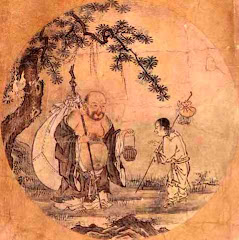
Buddha renounced in ignorance, not as a buddha. He renounced his palace and kingdom and luxuries, not as a buddha. He was in search of light, he was in darkness and doubt. He was as blind as anyone can be. In this blindness, in this darkness, he thought perhaps renouncing the kingdom, renouncing all comforts and luxuries was going to help him find truth.
What relationship is there? If this is the truth, that you have to renounce the kingdom, then how many people have kingdoms? Then the people who don't have kingdoms cannot become buddhas.
And how big was the kingdom? Do you understand? -- there were two thousand kingdoms in India at the time of Buddha. His kingdom was not more than a small tehsil -- a part of a district.
But when he became enlightened he came back to his palace to see his old father, whom he had betrayed in a way, because he had been hoping that in his old age his son would take over the burden of the kingdom, but instead he escaped. He was coming back after twelve years to ask forgiveness from the old man, and also his wife, and his son who was now grown twelve years... the night he was born was the night Gautam Buddha had escaped from the kingdom.
He had gone to see the face of the child, but the child was clinging to the mother and they were covered with blankets. He was afraid to wake up the wife because she might create some tantrum, and his renunciation of the world might be prevented -- or delayed, certainly. So he left from the door without seeing the face of his child.
After twelve years, when he became enlightened, the first thing he did was to go back to his kingdom. The father was very angry, but Buddha stood in absolute silence. When the father had said whatever he wanted to say, when his rage was finished, he looked again at the face of the Buddha -- he was absolutely unaffected. When his father had calmed down, Buddha said to him, "You are unnecessarily being angry with me. I am not the same person who left the palace. I am a new being, with eyes to see. I have achieved the ultimate. Just look at my face, my silence; look into my eyes and the depth of my eyes. Don't be angry, I have just come to ask your forgiveness that I had to renounce the kingdom. But I have brought a bigger kingdom of the inner, and I have come to share it with you, and all."
Then he entered into the palace to meet his wife. Of course she was angry... but she also belonged to a big empire. She was the daughter of a far bigger kingdom, and as the daughter of a great warrior she had waited for these twelve years without saying a word. What she said is immensely amazing.
She said to Gautam Buddha, "I am not angry that you renounced the kingdom. I am angry that you did not say anything to me when you left. Do you think I would have prevented you? I am also the daughter of a great warrior...."
Buddha felt very embarrassed; he had never thought about it. Her anger was not that he had renounced the kingdom -- that was his business. Her anger was that he did not trust in her, in her love; that he did not trust in her and thought she would have interfered in his renunciation. She was not that type of ordinary woman; she would have rejoiced that he was renouncing the kingdom.
Buddha had to ask forgiveness.
His wife -- her name was Yashodhara -- said, "For these twelve years I have been carrying only one question to ask to you. And that question is: whatever you have attained -- and certainly you have attained something, I can see it in your eyes, on your face, in your grace. My question is: Whatever you have attained, was it not possible to attain it in the palace, in the kingdom? Was renunciation necessary?"
Gautam Buddha said, "At that time I thought so, because for centuries it has been said that unless you renounce the world you cannot find the ultimate truth. But now I can say with absolute certainty, whatever has happened to me could have happened in the kingdom, in the palace; there was no need to go anywhere."




No comments:
Post a Comment